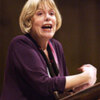
Rupert Shortt
Author of Rowan's Rule: The Biography of the Archbishop
11 Works 434 Members 5 Reviews
About the Author
Rupert Shortt is Religion Editor of the Times Literary Supplement.
Includes the name: Rupert Shott
Works by Rupert Shortt
Tagged
4 (2)
@johnbed (4)
Added January 2017 (1)
Anglican (15)
Anglicanism (2)
Apologetics (4)
Archbishop (2)
Archbishop of Canterbury (3)
atheism (4)
Benedict XVI (3)
biography (50)
black theology (2)
Catholicism (2)
Christian (2)
Christian Authors/ Rowan Williams (2)
Christian living (2)
Christian-Muslim dialogue (2)
Christianity (9)
Christianity and other religions (2)
Church History (3)
Church of England (2)
Church of England>Bishops>Biography (2)
comparative religion (2)
CR-1 (2)
Eerdmans (3)
feminist theology (2)
Hauerwas (2)
interviews (2)
non-fiction (4)
philosophy (5)
philosophy of religion (2)
politics (2)
religion (19)
Rowan Williams (10)
Theodicy (1)
Theology (24)
to-read (7)
UBS-14 (1)
Williams (2)
Wm. B. Eerdmans Publishing Co. (2)
Common Knowledge
Members
Reviews
Flagged
nwhyte | Apr 1, 2023 | A very readable, sympathetic account of a genuinely interesting man. Some unintended comedy arises when Shortt tries to criticize Williams; the only area in which Shortt can find disagreements is in economics. Our author consistently criticizes Williams for not understanding the great genius of modern capitalism. This book was published in 2008. Good work, Rupert! I hope Shortt is around to write a longer biography that treats the years since, and is also able to perhaps edit out some of these giggle-inducing lines, and replace them with his far more interesting and cogent theological reflections.… (more)
Flagged
stillatim | 3 other reviews | Oct 23, 2020 | The early chapters read like medieval hagiography. The little boy so interested in religion that he convinced his parents to change churches grew up into the young man who was so intelligent that he knew more than his professors, while also writing (wonderful, of course) poetry and plays.
It did get better later on, but I can't rid myself of the feeling that it was written to support Rowan Williams rather than to describe him. I know a lot more details than before, but not a lot about who he is.… (more)
It did get better later on, but I can't rid myself of the feeling that it was written to support Rowan Williams rather than to describe him. I know a lot more details than before, but not a lot about who he is.… (more)
Flagged
MarthaJeanne | 3 other reviews | May 24, 2015 | Rare but not unprecedented, a biography of an Anglican Archbishop seldom contends with the sheer volume of primary and secondary texts about its subject as Rupert Shortt must address in this book. Bringing adroit insights to his task, Shortt tells a fair account not only of Williams, but also of the life and times of Anglican Christians served by him from Lambeth Palace. His subject is the life of the Most Reverend and Right Honourable Lord Archbishop of Canterbury Rowan Williams. Presiding bishop for 80 million Anglicans worldwide, Williams serves primus inter pares among fellow bishops of the global Anglican Communion.
First among Anglican bishops by rank--attributed to the ancient titular See of Canterbury--intensifies attention to Williams's biographic stout and froth. Shortt provides more stout than froth, and limits affectations with a steady hand. Exploring critical decisions that Williams made from the time of his mid-twenties [66, 72-4], Shortt discloses details from his mentor's developmental years, which tarnished halo's that admirers had projected onto the young Rowan long before his initial episcopacy in Monmouth (1991 at age 41).
Just the same, Williams had earned respect from fellow Anglicans such as a talented "orthodox" philosopher-theologian from Cambridge University--Professor Donald MacKinnon [62-3, 128-9], and Fr. Henry Chadwick [121-2], Dean of Christ Church Cathedral Oxford. In addition, respect came early in his career from Orthodox theologians such as Father Andrew Louth of Durham [122] and Christos Yannaras of Athens and Thessaloniki [70-1].
Whether blamed or praised, at least Williams "...has not endured public disgrace and imprisonment" [425] while shepherding his Anglican herd of mavericks. However, he may well never become the darling of the left or the right. Why is this? Shorrt intimates at least a few reasons, such as the Archbishop's eclectic theological and pastoral interests as impossible to pin to ideologies [100; cf. Sharia controversy: 390-402] and poetic imagination [355 passim] as exemplified in these lines from "Kampala; the el Shaddai Coffee Bar:"
Eyes shine and water in the woodsmoke;
who can tell who might be
welcome here? [230]
In my opinion, some book reviewers of this 466 pp. text and Shortt's earlier [2002: 101] abbreviated introduction to Williams have created a tempest over the Archbishop's youthful romances--particularly reviewers in British, Welsh and Irish presses. They have either promoted calumny about imagined or exaggerated dalliances, or have failed to exercise critical reading skills to differentiate hubris from humility in Shortt's portrayal of Williams. Either way would create images of Williams that lack reference to this text.
If a particular verdict holds true in subsequent analyses of Williams's term in Canterbury that "dynamic hopes" were "deflated" by his service record as Archbishop [2], they might require as much appraisal of the dynamic hopes themselves as of the man. Himself a brilliant Oxford don and polyglot, Williams ventured into pastoral ministry with heroic dreams, but required more than intellectual accomplishments to purify his heart. One such example of Williams--a humbled heroic dreamer-- reveals how Williams had recovered through poetry after a one-sided romance sometime during his term as lecturer-in-residence at the Community of the Resurrection in Mirfield (Resurrection College, West Yorkshire, U.K.) [95-7].
Recovery from disappointment appears as a sub-theme throughout the biography. One such recovery was his marriage to a daughter of an Anglican bishop, Hilary Jane (nee) Paul in 1981 [107, 114-5], after having been awarded the D.Phil. in theology from Oxford in 1975, followed by diaconal ordination in the Church of England in 1977 [priesthood 1978]. Shortt entertains the theme of Williams's recoveries as evidence of his desire to pay the cost of Christian discipleship by denouncing his own "...self-delusion and many wrong turns" [71]. Indeed, Williams has been shown in this biography to be held accountable for his gifts from God.
Shortt quotes the Rt. Rev. Richard the Baron Harries of Pentregarth, Bishop of Oxford (ret.), who once said to Williams: "God has given you all the gifts, and as your punishment, he has made you Archbishop of Canterbury" [20]. Even humor packs a punch; the cost of following Christ is high for every Christian. "When someone is given a great deal, a great deal will be demanded of that person; when someone is entrusted with a great deal, of that person even more will be expected" [Luke 12:48, NJB].… (more)
First among Anglican bishops by rank--attributed to the ancient titular See of Canterbury--intensifies attention to Williams's biographic stout and froth. Shortt provides more stout than froth, and limits affectations with a steady hand. Exploring critical decisions that Williams made from the time of his mid-twenties [66, 72-4], Shortt discloses details from his mentor's developmental years, which tarnished halo's that admirers had projected onto the young Rowan long before his initial episcopacy in Monmouth (1991 at age 41).
Just the same, Williams had earned respect from fellow Anglicans such as a talented "orthodox" philosopher-theologian from Cambridge University--Professor Donald MacKinnon [62-3, 128-9], and Fr. Henry Chadwick [121-2], Dean of Christ Church Cathedral Oxford. In addition, respect came early in his career from Orthodox theologians such as Father Andrew Louth of Durham [122] and Christos Yannaras of Athens and Thessaloniki [70-1].
Whether blamed or praised, at least Williams "...has not endured public disgrace and imprisonment" [425] while shepherding his Anglican herd of mavericks. However, he may well never become the darling of the left or the right. Why is this? Shorrt intimates at least a few reasons, such as the Archbishop's eclectic theological and pastoral interests as impossible to pin to ideologies [100; cf. Sharia controversy: 390-402] and poetic imagination [355 passim] as exemplified in these lines from "Kampala; the el Shaddai Coffee Bar:"
Eyes shine and water in the woodsmoke;
who can tell who might be
welcome here? [230]
In my opinion, some book reviewers of this 466 pp. text and Shortt's earlier [2002: 101] abbreviated introduction to Williams have created a tempest over the Archbishop's youthful romances--particularly reviewers in British, Welsh and Irish presses. They have either promoted calumny about imagined or exaggerated dalliances, or have failed to exercise critical reading skills to differentiate hubris from humility in Shortt's portrayal of Williams. Either way would create images of Williams that lack reference to this text.
If a particular verdict holds true in subsequent analyses of Williams's term in Canterbury that "dynamic hopes" were "deflated" by his service record as Archbishop [2], they might require as much appraisal of the dynamic hopes themselves as of the man. Himself a brilliant Oxford don and polyglot, Williams ventured into pastoral ministry with heroic dreams, but required more than intellectual accomplishments to purify his heart. One such example of Williams--a humbled heroic dreamer-- reveals how Williams had recovered through poetry after a one-sided romance sometime during his term as lecturer-in-residence at the Community of the Resurrection in Mirfield (Resurrection College, West Yorkshire, U.K.) [95-7].
Recovery from disappointment appears as a sub-theme throughout the biography. One such recovery was his marriage to a daughter of an Anglican bishop, Hilary Jane (nee) Paul in 1981 [107, 114-5], after having been awarded the D.Phil. in theology from Oxford in 1975, followed by diaconal ordination in the Church of England in 1977 [priesthood 1978]. Shortt entertains the theme of Williams's recoveries as evidence of his desire to pay the cost of Christian discipleship by denouncing his own "...self-delusion and many wrong turns" [71]. Indeed, Williams has been shown in this biography to be held accountable for his gifts from God.
Shortt quotes the Rt. Rev. Richard the Baron Harries of Pentregarth, Bishop of Oxford (ret.), who once said to Williams: "God has given you all the gifts, and as your punishment, he has made you Archbishop of Canterbury" [20]. Even humor packs a punch; the cost of following Christ is high for every Christian. "When someone is given a great deal, a great deal will be demanded of that person; when someone is entrusted with a great deal, of that person even more will be expected" [Luke 12:48, NJB].… (more)
Flagged
Basileios919 | 3 other reviews | Mar 25, 2010 | Lists
Best Biographies (1)
You May Also Like
Statistics
- Works
- 11
- Members
- 434
- Popularity
- #56,344
- Rating
- ½ 3.3
- Reviews
- 5
- ISBNs
- 26










One of the religion books that I have logged on my LibraryThing catalogue, even though it’s really Anne’s. I found it a lot more to my taste than most Christian apologetic works; Shortt is arguing only that there should be space in public and private for an honest appreciation of spirituality and belief, and that the New Atheists completely and deliberately miss the point. There’s a quote from Rowan Williams referencing Doctor Who. The weakest part of the (mercifully short) book is when he gets into the specifics of Christian belief, as opposed to others, but as a general defence of religion as a concept, I felt it went to a lot of the places where I find my own sympathies engaged.… (more)